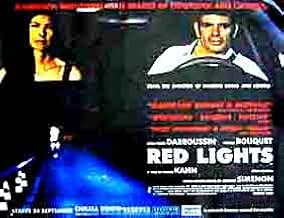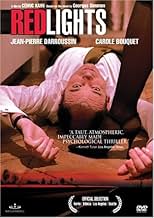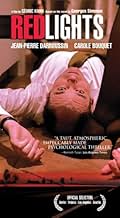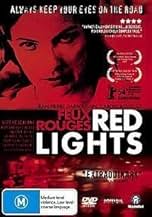VALUTAZIONE IMDb
6,6/10
3148
LA TUA VALUTAZIONE
Aggiungi una trama nella tua linguaA cross-country trip turns out to be a nightmare for a troubled couple.A cross-country trip turns out to be a nightmare for a troubled couple.A cross-country trip turns out to be a nightmare for a troubled couple.
- Regia
- Sceneggiatura
- Star
- Premi
- 2 candidature totali
Recensioni in evidenza
Red Lights is like a bad dream you might have if you nodded off over the wheel during a long car journey, with the roar of the motorway and the crunch of tyres on gravel seeping into your subconscious. It's so ambient, it would work just as well as a radio play. En route to collecting their kids from summer camp, 'married alive' couple Antoine (Pierre-Darroussin) and Helene (Bouquet) bicker in the car, as Antoine accuses her of cramping his style. The only way this sad little man can assert himself is to pull over and slug whisky after whisky in every roadside bar. When his furious wife bails out to catch the train instead, it's the start of one of those Long Dark Nights of the Soul for both parties. 'I got sick of playing the good little doggie', Antoine tells his mysterious hitchhiker, in one of the movie's most memorable exchanges. 'You're like my doggie,' sneers his passenger. 'Always thirsty.' 'Where's your dog?' 'He's dead
' Based on the Georges Simenon novel, here's a dark little number, blackly comic, and as searing as the red neon lights that accompany each pit stop on the road to Hell.
Director Cedric Kahn's "Red Lights" alternates between bright day and scary night. Antoine Dunand (Jean-Pierre Darrousin) is an insurance company employee who may enjoy a decent salary but he feels outclassed, and is out-earned I'm sure, by his corporate attorney spouse, Helene (Carole Bouquet). They have a nice, urban apartment and two young kids, a boy and a girl, both at camp eagerly awaiting pickup by their parents.
Antoine feels neglected by Helene, actually hated, and he even half-suspects her time with fellow male employees goes beyond business. He consoles himself with beer and scotch, preferably one after the other. He's clearly becoming, if he isn't already, an alcoholic.
The two leave to pick up their children from a distant camp. It's holiday-making time in France and the highways are jammed. An impatient Antoine, infuriated by the crawl, takes two successive detours, one off the main highway, the other for several refuelings at on-the-way bars. His driving becomes increasingly erratic, his wife's complaints more provocative. Eventually she realizes he's not just driving poorly, he's getting progressively more smashed. An argument ensues interrupting the classical music on their radio. Her anger at his driving is a coda for their growing estrangement. And then a bulletin announces a dangerous criminal has broken prison and is on the loose.
Recognizing that Antoine is really loaded and he won't yield the car keys, Helene runs off while her husband is knocking down scotch, leaving a note that she'll take a train.
Antoine is excessively upset at finding Helene missing-though befogged by booze, he also probably recognizes his own weirdness. Setting off to intercept her train he accepts a morosely quiet hitchhiker (Vincent Deniard), a fellow who offers no name but guess who he really is (hint above).
The film now enters a dark and isolated countryside where Antoine, despite his towering blood alcohol level, becomes justifiably afraid of his mostly silent young passenger.
The ride becomes a trip to terror for Antoine who sobers up enough to know he better master a deteriorating and life-threatening situation. Having done that he hunts for his wife. To tell more would be to spoil an original, well-acted story about fairly ordinary people who have let their marriage grow stale for all the usually mundane reasons that presage a relationship crisis.
The three main characters make "Red Lights," a title that superficially is about Antoine's reckless disregard of traffic signals but actually spotlights the warnings we receive and often ignore about impending personal crises, work. Largely unknown outside of French cinema, all three well-experienced and effective lead actors keep the viewer glued to the screen.
Compared to the current star vehicle hit, "Collateral," "Red Lights" carries forward true, outstanding noir drama by focusing on the straying from safe paths of ordinary people in common situations.
9/10
Antoine feels neglected by Helene, actually hated, and he even half-suspects her time with fellow male employees goes beyond business. He consoles himself with beer and scotch, preferably one after the other. He's clearly becoming, if he isn't already, an alcoholic.
The two leave to pick up their children from a distant camp. It's holiday-making time in France and the highways are jammed. An impatient Antoine, infuriated by the crawl, takes two successive detours, one off the main highway, the other for several refuelings at on-the-way bars. His driving becomes increasingly erratic, his wife's complaints more provocative. Eventually she realizes he's not just driving poorly, he's getting progressively more smashed. An argument ensues interrupting the classical music on their radio. Her anger at his driving is a coda for their growing estrangement. And then a bulletin announces a dangerous criminal has broken prison and is on the loose.
Recognizing that Antoine is really loaded and he won't yield the car keys, Helene runs off while her husband is knocking down scotch, leaving a note that she'll take a train.
Antoine is excessively upset at finding Helene missing-though befogged by booze, he also probably recognizes his own weirdness. Setting off to intercept her train he accepts a morosely quiet hitchhiker (Vincent Deniard), a fellow who offers no name but guess who he really is (hint above).
The film now enters a dark and isolated countryside where Antoine, despite his towering blood alcohol level, becomes justifiably afraid of his mostly silent young passenger.
The ride becomes a trip to terror for Antoine who sobers up enough to know he better master a deteriorating and life-threatening situation. Having done that he hunts for his wife. To tell more would be to spoil an original, well-acted story about fairly ordinary people who have let their marriage grow stale for all the usually mundane reasons that presage a relationship crisis.
The three main characters make "Red Lights," a title that superficially is about Antoine's reckless disregard of traffic signals but actually spotlights the warnings we receive and often ignore about impending personal crises, work. Largely unknown outside of French cinema, all three well-experienced and effective lead actors keep the viewer glued to the screen.
Compared to the current star vehicle hit, "Collateral," "Red Lights" carries forward true, outstanding noir drama by focusing on the straying from safe paths of ordinary people in common situations.
9/10
After "L'ennui", this was the second Cédric-Kahn-movie I have seen, and I found it great. Kahn proves himself a specialist on ridiculous men lacking self-confidence and absolutely inapt to retain some dignity in a modern world like this.
The thriller plot, as stated by some earlier commentators, may be a little weak, especially as regards the "man on the run" (he is obviously taken directly from the Simenon novel but his character is neither fish nor foul). But this is not what it is all about. The thriller plot is merely an excuse to give a touching and disturbing portrayal of character Antoine (and his marriage).
Let me answer to two of the "plot holes" discovered by two other commentators: Antoine's drinking does make sense; he drinks because of frustration and a minority complex for not feeling man enough in the presence of his successful wife. His drinking is a childish act of defiance, he is not a sensible grown-up, not a man (as he keeps repeating himself). And of course, he doesn't recall all these telephone numbers from his memory; as indicated with one of the first calls, he calls directory inquiries and has himself connected to the respective partner each time (remember, there is cuts between the various calls).
Red Lights is a brilliant character study concealed as a masterpiece of suspense. Darroussin gives a touching performance in his role as hero and anti-hero at the same time. He is not particularly likable but still makes us feel sorry for him.
The ending, which I am not going to reveal here, is stirring in a very subtle way because above all it raises the question how it is all going to go on.
I like stories in which weird things happen out of character logic. This is a particular successful one.
The thriller plot, as stated by some earlier commentators, may be a little weak, especially as regards the "man on the run" (he is obviously taken directly from the Simenon novel but his character is neither fish nor foul). But this is not what it is all about. The thriller plot is merely an excuse to give a touching and disturbing portrayal of character Antoine (and his marriage).
Let me answer to two of the "plot holes" discovered by two other commentators: Antoine's drinking does make sense; he drinks because of frustration and a minority complex for not feeling man enough in the presence of his successful wife. His drinking is a childish act of defiance, he is not a sensible grown-up, not a man (as he keeps repeating himself). And of course, he doesn't recall all these telephone numbers from his memory; as indicated with one of the first calls, he calls directory inquiries and has himself connected to the respective partner each time (remember, there is cuts between the various calls).
Red Lights is a brilliant character study concealed as a masterpiece of suspense. Darroussin gives a touching performance in his role as hero and anti-hero at the same time. He is not particularly likable but still makes us feel sorry for him.
The ending, which I am not going to reveal here, is stirring in a very subtle way because above all it raises the question how it is all going to go on.
I like stories in which weird things happen out of character logic. This is a particular successful one.
A decent but ultimately disappointing thriller. It feels like slow-moving imitation Clouzot, with elements from Les Diaboliques ("What really happened?"), The Wages of Fear (high tension on a long drive), and Quai des Orfevres (a similar plot point I don't want to reveal here).
With tighter editing, "Feux rouges" could have been a much stronger movie. It does contain a number of memorable scenes, especially those involving the protagonist and his second passenger. Not a bad film at all, but it doesn't deserve the rave reviews it has drawn from several major critics.
7/10
With tighter editing, "Feux rouges" could have been a much stronger movie. It does contain a number of memorable scenes, especially those involving the protagonist and his second passenger. Not a bad film at all, but it doesn't deserve the rave reviews it has drawn from several major critics.
7/10
Opens with brilliantly shot sequences and if it then moves into more traditional French bourgeoisie territory it does it with passion and intelligence. As the narrative unfolds, involving a car drive that begins tetchy and proceeds to become really scary, we identify with the main protagonists and are as concerned as the male lead when the other disappears. A lot of the first part of the film is shot through the front screen of the car but this is so well done with the accompanying dialogue, developing tragedy and suspense we are almost on the edge of our seats. We lurch into nightmare territory and things become almost unbearable as we struggle to assure ourselves as to what is really happening. I was not as interested as the director in the relationship between the high flying wife and the husband who sees himself as her poodle and presumably this is why I found the ending simplistic and verging on the insulting, but never mind a good ride up to then!
Lo sapevi?
- BlooperAt the beginning of the movie, the main characters meet at a cafe in the late afternoon. They then go home and get ready to travel to Bordeaux to pick up their kids. On the trip to Bordeaux, they are stuck in heavy traffic. Although it is now early evening, the vertical shadows cast by the cars indicate that the traffic scenes were shot at mid-day.
- ConnessioniEdited into Le documentaire culturel: Le siècle de Simenon (2014)
- Colonne sonoreNuages
from "Nocturnes"
Written by Claude Debussy
Performed by Etienne Baudo and LOrchestre de l'Opéra national de Paris
Conducted by Manuel Rosenthal
I più visti
Accedi per valutare e creare un elenco di titoli salvati per ottenere consigli personalizzati
- How long is Red Lights?Powered by Alexa
Dettagli
- Data di uscita
- Paese di origine
- Sito ufficiale
- Lingue
- Celebre anche come
- Red Lights
- Luoghi delle riprese
- Cléré les Pins, Francia(The garage where Antoine has his tyre changed.)
- Aziende produttrici
- Vedi altri crediti dell’azienda su IMDbPro
Botteghino
- Lordo Stati Uniti e Canada
- 673.828 USD
- Fine settimana di apertura Stati Uniti e Canada
- 3202 USD
- 22 ago 2004
- Lordo in tutto il mondo
- 2.394.429 USD
- Tempo di esecuzione1 ora 45 minuti
- Colore
- Mix di suoni
- Proporzioni
- 1.85 : 1
Contribuisci a questa pagina
Suggerisci una modifica o aggiungi i contenuti mancanti

Divario superiore
By what name was Luci nella notte (2004) officially released in India in English?
Rispondi





















